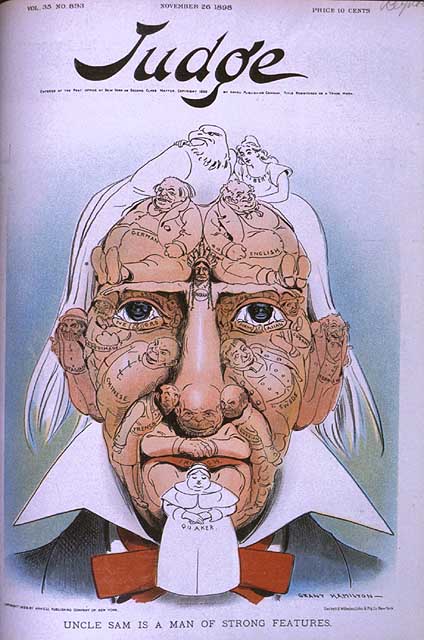Uncle Sam - Strong Features

"Uncle Sam is a Man of Strong Features" (1898)
Monday, December 12, 2011
questions for shteyengart's 'mother tongue'
Tuesday, December 6, 2011
Discussion questions for "Joebell and America"
Questions for Who's Irish?
1. How does the story being told from the perspective of the grandmother impact your view on who is in the right and who is in the wrong in this situation? Does it make you empathize more with the grandmother?
2. This story presents the issue of the cultural gap that exists within an interracial family, but also presents the issue of the generational gap that exists among many parents and their children, regardless of race. Both are deep-rooted in a lack of communication. Which do you think is easier to triumph?
3. How is it that by the end of the story, John’s brothers are miserable living with their mother, John is depressed without a job, and Natalie is exhausted with nobody to turn to? Do you think the author was trying to prove anything by ending the story with Bess and Sophie’s grandmother as the only two people happy?
4. The grandmother’s parenting style is reminiscent of Amy Chua’s, better known as the “Tiger Mom” who caused controversy earlier in the year, when she wrote a piece for the WSJ titled “Why Chinese Moms are Superior”, revealing the practices of some Chinese parents who raised stereotypically “successful” kids. Both parenting styles are based on strict child rearing to achieve the specific goal at hand. Ultimately, they get their children to achieve the goal, but they completely disregard the child’s self-esteem. Does the effectiveness of this approach make it acceptable? Link to article: http://online.wsj.com/article/SB10001424052748704111504576059713528698754.html
5. Deciding which parenting techniques work best for your family is a challenge. Naturally, a parent turns to his or her own experiences as a child to decide what techniques worked well and what techniques didn’t work well, just as Natalie did. Natalie and her mother turned out to have opposing views, as is the case among most parents and their children. Did Natalie cross the line of disrespect by kicking her mother out of her house, or was her defending of her family admirable?
Thursday, December 1, 2011
Discussion Questions for The Dew Breaker
1. Why do you think the preacher keeps referring to his wife's death with such great detail, in sermon and in thought?
2. Anne is upset with the preacher for spending all of his time talking about the government and trying to turn people against them. She then explains how he walked out on his own family, Why do you think he devoted his time away from his family and instead, to activism?
3. On page 216, Rosalie is introduced. Do you find it strange that a government as corrupt and oppressive as this allows women to hold any kind of superior rank, let alone any rank, in the Volunteers?
4. Had the preacher not attacked the fat man with the splintered leg of the chair, do you think he would have been released from the jail?
5. What kind of political statement do you think Danticat is trying to make in writing this novel?